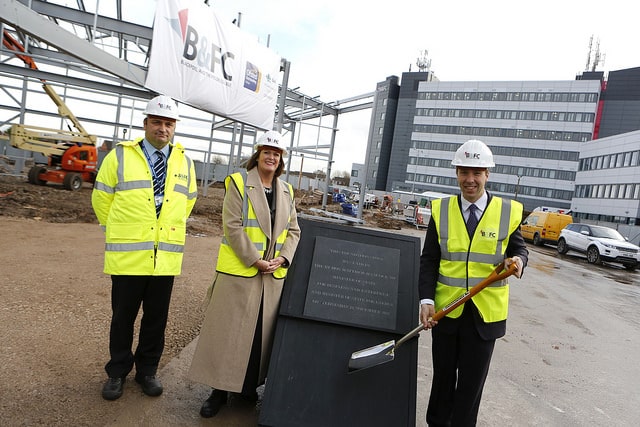The UK’s first industry-sponsored onshore shale gas college has been launched to train students, teachers and industry regulators.
The new National College for Onshore Oil and Gas will receive £1.5m in funding from industry representatives UK Onshore Oil and Gas (UKOOG) and the government’s Department for Business, Innovation and Skills (BIS).
Headquartered at Blackpool and The Fylde College (B&FC), the college will provide technical qualifications from A-levels through to postgraduate degrees. It also aims to “help [children] make the right subject choices early on,” and to “encourage children to consider careers in the industry.”
Matthew Hancock MP, the business, enterprise and energy minister announced the plans earlier this week and confirmed the college’s main hub will be in Blackpool, an area synonymous with fracking development and industry.
It will also be linked to colleges in Chester, Redcar and Cleveland, Glasgow and Portsmouth.
Highbury College in Portsmouth for instance, is currently developing “a strong partnership” with the Southern Alberta Institute of Technology in Calgary – Canada’s oil and gas hub.
The Next Generation
Convincing future generations of the benefits of fracking is no new tactic for the shale industry.
In 2011, the industry came out with the “Talisman Terry, your friendly Fracosaurus” colouring book by Canadian energy company, Talisman Energy. And last January, Ohio’s oil and gas industry conducted a statewide tour – sponsored by Radio Disney – to promote fracking to elementary school children.
Speaking at the college headquarters, Hancock stated: “Shale gas is an enormous opportunity for the UK and one that we simply can’t afford to miss out on.
“Imagine if we had passed up a similar opportunity to go into the North Sea some fifty years ago. What if we’d let that oil and gas stay in the ground? What if we’d said it was too difficult or too controversial?”
A recent report by industry representatives UKOOG described shale gas as a potential £33 billion investment opportunity for British business over the next 15 years, which could generate 64,000 jobs.
But not everyone agrees. Friends of the Earth North West campaigner Helen Rimmer said: “The North West deserves investment in jobs and skills, but this should be in energy sectors of the future such as tidal, wave and solar which the region has in abundance – not dead-end fossil fuels.”
Stale Shale
Plus, the UK has a seemingly short supply of skilled workers that could sustain any potential ‘shale boom’ – a fact the new fracking college has clearly tapped into.
“I am not prepared to pass up a once-in-a-generation economic opportunity,” stated Hancock.
Prior to launching the fracking college UKOOG and BIS commissioned consultants EY to assess the skills requirements of an onshore fracking industry to produce shale gas at scale.
The study concluded that “there is currently limited capability in the UK for hydraulic fracturing engineers … There are already shortages in the related offshore and chemical industries, and therefore a risk that these are further exacerbated by a high level of shale production.”
According to EY, the lead time to develop a hydraulic fracturing engineer with the right level of experience could be as long as five years. Developing a new training programme could take up to four years.
It’s no surprise that the industry is eager to move forward. You can’t have a shale revolution without skilled workers to extract the gas.
Yet doubt remains as recent reports continue to undermined industry projections.
One 2013 survey of more than 30,000 oil and gas industry workers found that 50 per cent of respondents believed the government’s strategy for shale gas production is “unsustainable.”
The CEO of fracking company Centrica has also, just this week, expressed concern regarding the anticipated shale gas boom: “UK shale revolution either isn’t going to happen at all or it’s going to be a long time coming.”
But consistent industry pressure from both UK and US firms has pushed the government into supporting shale gas exploration amidst increasing public opposition.
This has led to the creation of industry-funded pressure groups like Blackpool’s very own North West Shale Gas Task Force which is commissioned to promote shale in an area that has suffered two serious earthquakes caused by fracking operations operated by fracking company Cuadrilla.
The Wrong Priorities
Talking to the Associated Press, Andrew Cooper, Green Party energy spokesperson said: “The UK needs to be investing more in renewable energy, not finding more exotic ways of extracting hydrocarbons from the ground.
“The UK is likely to fail to achieve its EU renewable energy targets. It is clear that the self-proclaimed ‘greenest government ever’ has the wrong priorities.”
Questions also remain as to how many students will apply to the college given the already low level of interest in onshore drilling indicated by EY’s findings.
Critics are eager to clarify whether this is truly a smart investment of taxpayers’ money in an industry that may never happen, leaving a generation of workers with potentially unmarketable skills and as disillusioned as they were before.
As Rimmer puts it: “If our energy ministers think fracking will help tackle the nation’s energy challenges perhaps they need to go back to college.”
Photo: Blackpool and The Fylde College, Steve Redfern
Subscribe to our newsletter
Stay up to date with DeSmog news and alerts







